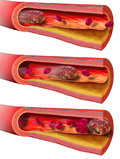Embolus
Embolus is a medical term referring to an unattached mass that travels through the bloodstream and is capable of clogging arterial capillary beds. This can lead to tissue death or infarction. Emboli are usually blood clots, but they can also be fat globules, air bubbles, or other substances.
Types of Emboli[edit]
There are several types of emboli, including:
- Thromboembolism: This is the most common type of embolus. It is a blood clot that has formed in one part of the body and travels to another part of the body.
- Fat Embolism: This type of embolus is composed of fat particles and usually occurs after a bone fracture or major trauma.
- Air Embolism: This type of embolus is composed of air bubbles. It can occur during certain medical procedures or from decompression sickness.
- Amniotic Fluid Embolism: This rare type of embolus occurs when amniotic fluid enters the mother's bloodstream during childbirth.
Symptoms[edit]
The symptoms of an embolus depend on where the embolus lodges in the body. Common symptoms include:
Diagnosis[edit]
Diagnosis of an embolus often involves imaging tests such as a CT scan or MRI. Blood tests may also be used to detect certain substances that are released when a clot forms and then breaks apart.
Treatment[edit]
Treatment for an embolus depends on the type of embolus and where it is located. Treatments may include:
- Anticoagulants: These are medications that prevent clots from forming.
- Thrombolytics: These are medications that dissolve clots.
- Surgery: In some cases, surgery may be needed to remove the embolus.
Prevention[edit]
Prevention of emboli involves reducing risk factors for clot formation, such as maintaining a healthy weight, not smoking, and managing chronic conditions like diabetes and high blood pressure.
Ad. Transform your life with W8MD's Budget GLP-1 injections from $75


W8MD offers a medical weight loss program to lose weight in Philadelphia. Our physician-supervised medical weight loss provides:
- Weight loss injections in NYC (generic and brand names):
- Zepbound / Mounjaro, Wegovy / Ozempic, Saxenda
- Most insurances accepted or discounted self-pay rates. We will obtain insurance prior authorizations if needed.
- Generic GLP1 weight loss injections from $75 for the starting dose.
- Also offer prescription weight loss medications including Phentermine, Qsymia, Diethylpropion, Contrave etc.
NYC weight loss doctor appointmentsNYC weight loss doctor appointments
Start your NYC weight loss journey today at our NYC medical weight loss and Philadelphia medical weight loss clinics.
- Call 718-946-5500 to lose weight in NYC or for medical weight loss in Philadelphia 215-676-2334.
- Tags:NYC medical weight loss, Philadelphia lose weight Zepbound NYC, Budget GLP1 weight loss injections, Wegovy Philadelphia, Wegovy NYC, Philadelphia medical weight loss, Brookly weight loss and Wegovy NYC
|
WikiMD's Wellness Encyclopedia |
| Let Food Be Thy Medicine Medicine Thy Food - Hippocrates |
Medical Disclaimer: WikiMD is not a substitute for professional medical advice. The information on WikiMD is provided as an information resource only, may be incorrect, outdated or misleading, and is not to be used or relied on for any diagnostic or treatment purposes. Please consult your health care provider before making any healthcare decisions or for guidance about a specific medical condition. WikiMD expressly disclaims responsibility, and shall have no liability, for any damages, loss, injury, or liability whatsoever suffered as a result of your reliance on the information contained in this site. By visiting this site you agree to the foregoing terms and conditions, which may from time to time be changed or supplemented by WikiMD. If you do not agree to the foregoing terms and conditions, you should not enter or use this site. See full disclaimer.
Credits:Most images are courtesy of Wikimedia commons, and templates, categories Wikipedia, licensed under CC BY SA or similar.
Translate this page: - East Asian
中文,
日本,
한국어,
South Asian
हिन्दी,
தமிழ்,
తెలుగు,
Urdu,
ಕನ್ನಡ,
Southeast Asian
Indonesian,
Vietnamese,
Thai,
မြန်မာဘာသာ,
বাংলা
European
español,
Deutsch,
français,
Greek,
português do Brasil,
polski,
română,
русский,
Nederlands,
norsk,
svenska,
suomi,
Italian
Middle Eastern & African
عربى,
Turkish,
Persian,
Hebrew,
Afrikaans,
isiZulu,
Kiswahili,
Other
Bulgarian,
Hungarian,
Czech,
Swedish,
മലയാളം,
मराठी,
ਪੰਜਾਬੀ,
ગુજરાતી,
Portuguese,
Ukrainian





